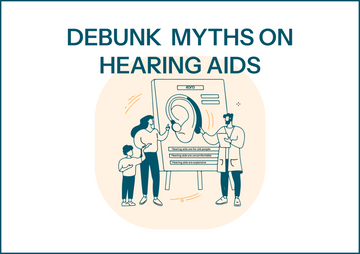Hearing loss is a common issue that affects millions of people across the globe. As we age, many begin to notice the subtle hints of declining auditory function, often leading them to explore their options. Whether it’s through consulting an audiologist or searching for the best OTC hearing aid, understanding the cost associated with hearing aids is essential for prospective users. In this article, we will explore the factors that influence the price of hearing aids, the different types available, and tips for making an informed decision.
The Importance of Addressing Hearing Loss
Ignoring hearing loss can lead to various complications, including social withdrawal, cognitive decline, and an overall decrease in quality of life. By addressing hearing loss with the right device, individuals can regain their connection to the world around them and improve their overall well-being. Furthermore, hearing aids are not just for the elderly; they can be beneficial for individuals of all ages experiencing auditory difficulties, including those suffering from tinnitus.
Defining Hearing Aids
Hearing aids are electronic devices designed to amplify sound for individuals with hearing loss. They come in various styles and designs, each tailored to meet the unique needs of different types of hearing impairment. As technology continues to advance, the cost and features of hearing aids also evolve. Understanding these options will help you choose the right device for your needs and budget.
Types of Hearing Aids
- Behind-the-Ear (BTE) Hearing Aids: These devices sit behind the ear and connect to a custom earpiece. They are known for their durability and can accommodate a wide range of hearing losses.
- In-the-Ear (ITE) Hearing Aids: Comprised of a shell that fits directly in the ear canal, ITEs are discreet and offer a natural sound experience.
- Receiver-in-Canal (RIC): Similar to BTE aids, but with a receiver in the canal, providing a clear sound and more natural experience.
- OTC Hearing Aids: These over-the-counter options are designed for mild to moderate hearing loss. They provide accessibility and affordability for those who may not consult an audiologist.
Factors Influencing the Cost of Hearing Aids
When considering hearing aids, price can widely vary based on several factors. Here are some key aspects that influence the overall cost:
Technology and Features
The cost of hearing aids is significantly affected by the technology they incorporate. Modern hearing aids are equipped with advanced features such as:
- Noise Cancellation: Helps to filter out background noise, making conversations clearer.
- Bluetooth Connectivity: Allows users to connect their devices wirelessly to smartphones and other gadgets.
- Rechargeable Batteries: Eliminating the need for regular battery replacements.
More features typically correlate with higher costs, but they can also offer greater benefit depending on your lifestyle and specific needs. A consultation with an audiologist can help you determine what features are essential for your circumstances.
Fitting and Customization
Each person's hearing loss is unique, warranting a tailored approach to treatment. Custom-fit hearing aids require professional fittings and adjustments done by an audiologist, which can contribute to higher costs. OTC hearing aids, while more affordable, may lack the personalized adjustments that custom devices provide. It’s essential to balance your need for customization with your budget when selecting a hearing aid.
Insurance Coverage and Financing Options
Insurance coverage for hearing aids varies greatly between providers. Some plans may cover part or all of the cost, while others may not provide any assistance. Before making a purchase, it’s wise to verify what your insurance covers. In addition to traditional financing, many hearing aid companies offer payment plans to help spread the cost over time, ensuring affordability for those who may struggle with the upfront price.
The Hidden Costs of Hearing Aids
Owning a hearing aid comes with additional costs beyond the initial purchase price. Be mindful of the following ongoing expenses:
- Routine Maintenance: Regular cleaning and maintenance are essential to prolong the lifespan of your hearing aids.
- Battery Replacement: For non-rechargeable devices, budget for ongoing battery costs.
- Upgrades: As technology evolves, you might find it beneficial to upgrade your device periodically.
Assessing the Value of Hearing Aids
When evaluating the cost of hearing aids, it’s vital to consider the value they provide. Properly fitting, high-quality devices can drastically improve communication, social well-being, and mental health. By addressing hearing loss, individuals experience:
- Improved relationships and social interactions.
- Better cognitive function and mental health.
- Increased independence.
Your Hearing Health Matters
Taking proactive steps to manage hearing loss is crucial. By consulting with an audiologist and considering available devices, individuals can embark on the path to better hearing. Whether you opt for a premium device with all the bells and whistles or a more economical OTC hearing aid, what matters most is the willingness to address hearing difficulties head-on.
When to Seek Professional Help
If you or a loved one suspect hearing loss, it’s time to talk to a professional. An audiologist can provide an accurate diagnosis and guide you through the available solutions. Ignoring hearing issues can have lasting repercussions, but early intervention can pave the way for improved auditory experiences.
Understanding Tinnitus
Tinnitus is a common condition characterized by a ringing or buzzing sound in the ears, often accompanying hearing loss. For those experiencing tinnitus, consult with an audiologist who can recommend hearing aids specifically designed to alleviate symptoms and improve overall hearing capabilities.
Navigating Your Hearing Aids Journey
As the process of acquiring hearing aids can be overwhelming, consider the following tips to ease your journey:
- Research: Familiarize yourself with the various types of hearing aids and their costs.
- Consultation: Schedule an appointment with an audiologist to discuss your specific needs.
- Trial Periods: Take advantage of trial periods offered by some audiologists to determine which hearing aids work best for you.
- Stay Informed: Stay updated on emerging technologies and features to make an informed choice.
A Journey Towards Better Hearing Awaits
Investing in hearing aids is an investment in your quality of life. By understanding the costs, the technology available, and seeking professional guidance, you can make an informed decision that ensures your hearing loss is effectively addressed. Whether it’s through an OTC hearing aid or a custom-fit option prescribed by an audiologist, taking the first step toward better hearing can lead to a brighter, more connected future.

























